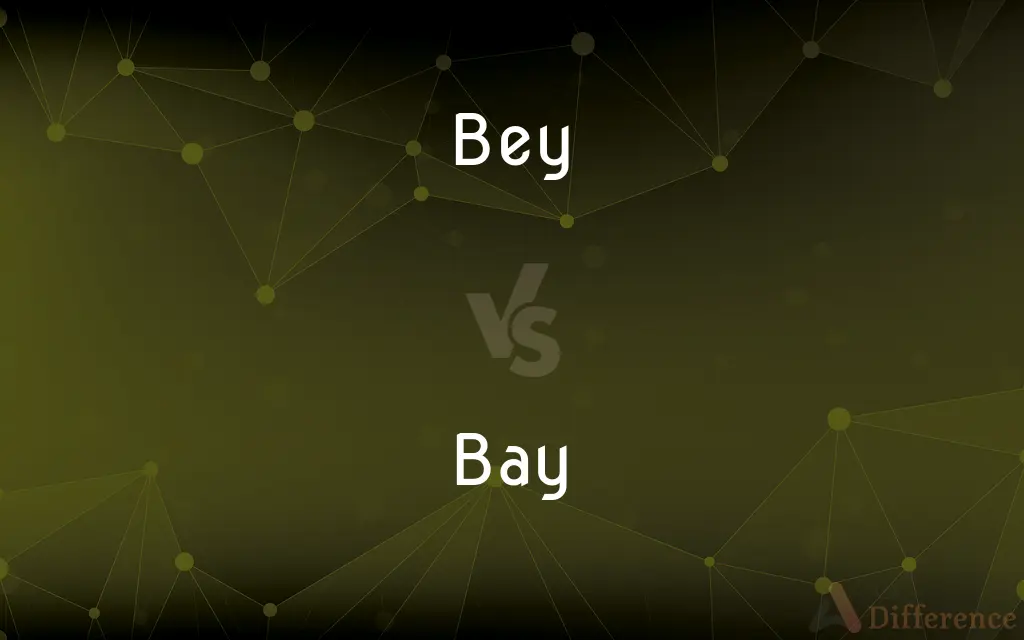Bey vs. Bay — What's the Difference?
By Tayyaba Rehman & Urooj Arif — Updated on April 14, 2024
Bey is a title for a Turkish leader, while bay refers to a body of water partially enclosed by land.

Difference Between Bey and Bay
Table of Contents
ADVERTISEMENT
Key Differences
Bey was historically used as a title of respect for Turkish leaders and officials, signifying authority in Ottoman and earlier Turkic contexts. In contrast, bay describes a geographic feature where the land curves inward, sheltering the water within.
In the Ottoman Empire, a bey might govern a specific district or region, wielding significant political and military influence. Conversely, a bay serves primarily as a natural harbor, offering safe anchorage and protection from harsh sea conditions.
The role of a bey in Turkish society was often hereditary, passing from father to son, which cemented familial power structures over time. Meanwhile, the ecological and economic importance of a bay can shape the development of the surrounding communities, influencing fishing, commerce, and tourism.
Culturally, the title bey is embedded in numerous historical narratives and literature, symbolizing status and leadership within Turkish and related societies. On the other hand, bays are frequently highlighted in geographical and environmental studies, focusing on their roles in biodiversity and natural resource management.
Today, the term bey is less commonly used as a formal title but remains part of names and cultural expressions, reflecting its historical significance. In contrast, the term bay continues to be relevant in geographical and environmental contexts, describing specific parts of coastal landscapes.
ADVERTISEMENT
Comparison Chart
Definition
A title for a Turkish leader
A body of water partially enclosed by land
Context
Political and social
Geographical and environmental
Relevance
Historical and cultural
Ongoing, with ecological importance
Usage in Literature
Common in historical narratives
Common in geographical descriptions
Modern Usage
Part of names and expressions
Integral to environmental discussions
Compare with Definitions
Bey
An honorific in Ottoman society.
As a mark of his service, he was bestowed the title of bey.
Bay
Part of coastal geography.
The bay area is known for its rich biodiversity.
Bey
Part of a name indicating respect.
Osman Bey went on to found an empire.
Bay
A body of water enclosed by land on three sides.
The ship sailed into the calm waters of the bay.
Bey
A Turkish official title.
He was appointed as the bey of the province.
Bay
A natural harbor.
Fishermen returned their boats to the safety of the bay.
Bey
A leader in certain Turkic cultures.
The village looked to their bey for guidance during the crisis.
Bay
An ecological resource.
The bay is crucial for the local marine life.
Bey
A historical authority figure.
The bey ruled over the district with fairness.
Bay
A scenic element in landscapes.
The bay provided a stunning backdrop for the festival.
Bey
"Bey" (Ottoman Turkish: بك “Beik”, Chagatay: بك “Bek”, Turkmen: beg, Uzbek: bek, Kazakh: бек, Tatar: bäk, Albanian: beu/bej, Bosnian: beg, Persian: بیگ “Beigh” or بگ “Beg”, Tajik: бе, Arabic: بك “Bek”) is a Turkic title for a chieftain, and an honorific, traditionally applied to people with special lineages to the leaders or rulers of variously sized areas in the numerous Turkic kingdoms, emirates, sultanates and empires in Central Asia, South Asia, and The Middle East, such as the Ottomans, Timurids or the various khanates and emirates in Central Asia and the Eurasian Steppe. The feminine equivalent title was begum.
Bay
A bay is a recessed, coastal body of water that directly connects to a larger main body of water, such as an ocean, a lake, or even another bay. A large bay is usually called a gulf, sea, sound, or bight.
Bey
A provincial governor in the Ottoman Empire.
Bay
A body of water partially enclosed by land but with a wide mouth, affording access to the sea
The Bay of Biscay.
Bey
A ruler of the former kingdom of Tunis.
Bay
An area of land, such as an arm of prairie partially enclosed by woodland, that resembles in shape or formation a partially enclosed body of water.
Bey
Used as the title for such a ruler.
Bay
(Architecture) A part of a building marked off by vertical elements, such as columns or pilasters
An arcade divided into ten bays.
Bey
Used formerly as a title for various Turkish and Egyptian dignitaries.
Bay
A bay window.
Bey
(historical) A governor of a province or district in the Turkish dominions
Bay
An opening or recess in a wall.
Bey
In various other places, a prince or nobleman
Bay
A section or compartment, as in a service station, barn, or aircraft, that is set off for a specific purpose
A cargo bay.
An engine bay.
Bey
A governor of a province or district in the Turkish dominions; also, in some places, a prince or nobleman; a beg; as, the bey of Tunis.
Bay
A sickbay.
Bey
(formerly) a title of respect for a man in Turkey or Egypt;
He introduced me to Ahmet Bey
Bay
(Computers) A drive bay.
Bey
The governor of a district or province in the Ottoman Empire
Bay
A reddish brown.
Bay
A reddish-brown animal, especially a horse having a black mane and tail.
Bay
A deep, prolonged bark, such as the sound made by hounds.
Bay
The position of one cornered by pursuers and forced to turn and fight at close quarters
The hunters brought their quarry to bay.
Bay
The position of having been checked or held at a distance
"He has seen the nuclear threat held at bay for 40 years" (Earl W. Foell).
Bay
See laurel.
Bay
Any of certain other trees or shrubs with aromatic foliage, such as the California laurel.
Bay
A crown or wreath made especially of the leaves and branches of the laurel and given as a sign of honor or victory.
Bay
Often bays Honor; renown.
Bay
Reddish-brown
A bay colt.
Bay
To utter a deep, prolonged bark.
Bay
To pursue or challenge with barking
"I had rather be a dog, and bay the moon" (Shakespeare).
Bay
To express by barking or howling
A mob baying its fury.
Bay
To bring to bay
"too big for the dogs which tried to bay it" (William Faulkner).
Bay
(obsolete) A berry.
Bay
, a tree or shrub of the family Lauraceae, having dark green leaves and berries.
Bay
Bay leaf, the leaf of this or certain other species of tree or shrub, used as a herb.
Bay
The leaves of this shrub, woven into a garland used to reward a champion or victor; hence, fame, victory.
Bay
A tract covered with bay trees.
Bay
A kind of mahogany obtained from Campeche in Mexico.
Bay
(geography) A body of water (especially the sea) more-or-less three-quarters surrounded by land.
Bay
A bank or dam to keep back water.
Bay
An opening in a wall, especially between two columns.
Bay
An internal recess; a compartment or area surrounded on three sides.
Bay
The distance between two supports in a vault or building with a pitched roof.
Bay
(nautical) Each of the spaces, port and starboard, between decks, forward of the bitts, in sailing warships.
Bay
(rail transport) A bay platform.
Bay
A bay window.
Bay
The excited howling of dogs when hunting or being attacked.
Bay
(by extension) The climactic confrontation between hunting-dogs and their prey.
Bay
(figuratively) A state of being obliged to face an antagonist or a difficulty, when escape has become impossible.
Bay
A brown colour/color of the coat of some horses.
Bay
A horse of this color.
Bay
(intransitive) To howl.
Bay
(transitive) To bark at; hence, to follow with barking; to bring or drive to bay.
To bay the bear
Bay
(transitive) To pursue noisily, like a pack of hounds.
Bay
Of a reddish-brown colour (especially of horses).
Bay
Reddish brown; of the color of a chestnut; - applied to the color of horses.
Bay
An inlet of the sea, usually smaller than a gulf, but of the same general character.
Bay
A small body of water set off from the main body; as a compartment containing water for a wheel; the portion of a canal just outside of the gates of a lock, etc.
Bay
A recess or indentation shaped like a bay.
Bay
A principal compartment of the walls, roof, or other part of a building, or of the whole building, as marked off by the buttresses, vaulting, mullions of a window, etc.; one of the main divisions of any structure, as the part of a bridge between two piers.
Bay
A compartment in a barn, for depositing hay, or grain in the stalks.
Bay
A kind of mahogany obtained from Campeachy Bay.
Bay
A berry, particularly of the laurel.
Bay
The laurel tree (Laurus nobilis). Hence, in the plural, an honorary garland or crown bestowed as a prize for victory or excellence, anciently made or consisting of branches of the laurel.
The patriot's honors and the poet's bays.
Bay
A tract covered with bay trees.
Bay
Deep-toned, prolonged barking.
Bay
A state of being obliged to face an antagonist or a difficulty, when escape has become impossible.
Embolden'd by despair, he stood at bay.
The most terrible evils are just kept at bay by incessant efforts.
Bay
A bank or dam to keep back water.
Bay
To bark, as a dog with a deep voice does, at his game.
The hounds at nearer distance hoarsely bayed.
Bay
To bark at; hence, to follow with barking; to bring or drive to bay; as, to bay the bear.
Bay
To bathe.
Bay
To dam, as water; - with up or back.
Bay
An indentation of a shoreline larger than a cove but smaller than a gulf
Bay
The sound of a hound on the scent
Bay
Small Mediterranean evergreen tree with small blackish berries and glossy aromatic leaves used for flavoring in cooking; also used by ancient Greeks to crown victors
Bay
A compartment on a ship between decks; often used as a hospital;
They put him in the sick bay
Bay
A compartment in an aircraft used for some specific purpose;
He opened the bomb bay
Bay
A small recess opening off a larger room
Bay
A horse of a moderate reddish-brown color
Bay
Utter in deep prolonged tones
Bay
Bark with prolonged noises, of dogs
Bay
(used of animals especially a horse) of a moderate reddish-brown color
Common Curiosities
What is a bay?
A geographic feature where the land curves inward, creating a partially enclosed body of water.
What is a bey?
A title used historically in Ottoman and Turkic regions to denote a leader or an official.
How was the title 'bey' used?
It was used to signify leadership, often in a hereditary manner within families.
Was the title bey hereditary?
Often, the title was passed down within families in the societies that used it.
What are the ecological roles of a bay?
Bays serve as natural harbors, supporting biodiversity and facilitating commerce and fishing.
Can bey be used in contemporary contexts?
While less common today, it is still used within historical or cultural discussions.
How does a bay impact local geography?
Bays influence coastal landscapes and can determine the economic activities of a region.
What kinds of activities are bays used for?
Bays are used for fishing, boating, and sometimes as tourist attractions.
Does the term bey appear in modern names?
Yes, it is sometimes included in names to reflect respect or heritage.
Are bays important for environmental conservation?
Yes, they are critical for conserving marine environments and species.
Is bey related to any specific cultures?
Yes, it is particularly associated with Turkish and Turkic cultures.
How do bays affect climate?
Bays can moderate local climates by influencing sea breezes and fog.
Share Your Discovery

Previous Comparison
Breach vs. Broach
Next Comparison
Conflate vs. ConfuseAuthor Spotlight
Written by
Tayyaba RehmanTayyaba Rehman is a distinguished writer, currently serving as a primary contributor to askdifference.com. As a researcher in semantics and etymology, Tayyaba's passion for the complexity of languages and their distinctions has found a perfect home on the platform. Tayyaba delves into the intricacies of language, distinguishing between commonly confused words and phrases, thereby providing clarity for readers worldwide.
Co-written by
Urooj ArifUrooj is a skilled content writer at Ask Difference, known for her exceptional ability to simplify complex topics into engaging and informative content. With a passion for research and a flair for clear, concise writing, she consistently delivers articles that resonate with our diverse audience.















































